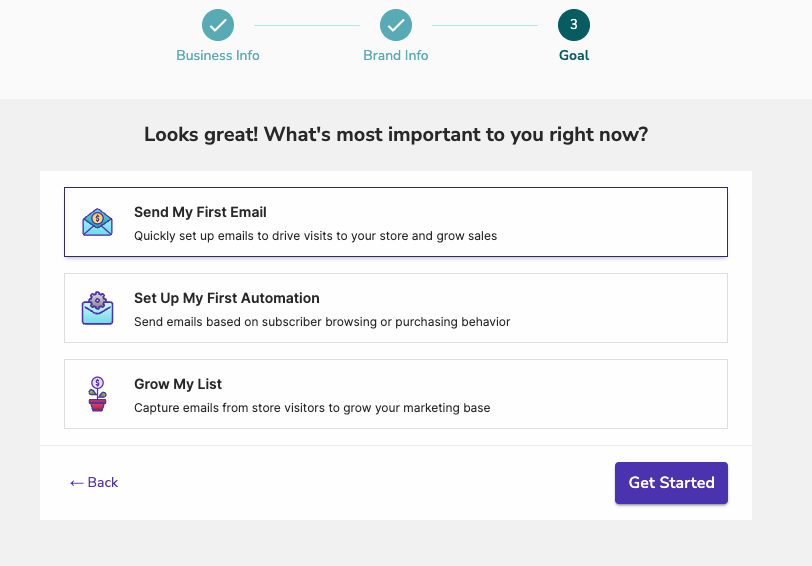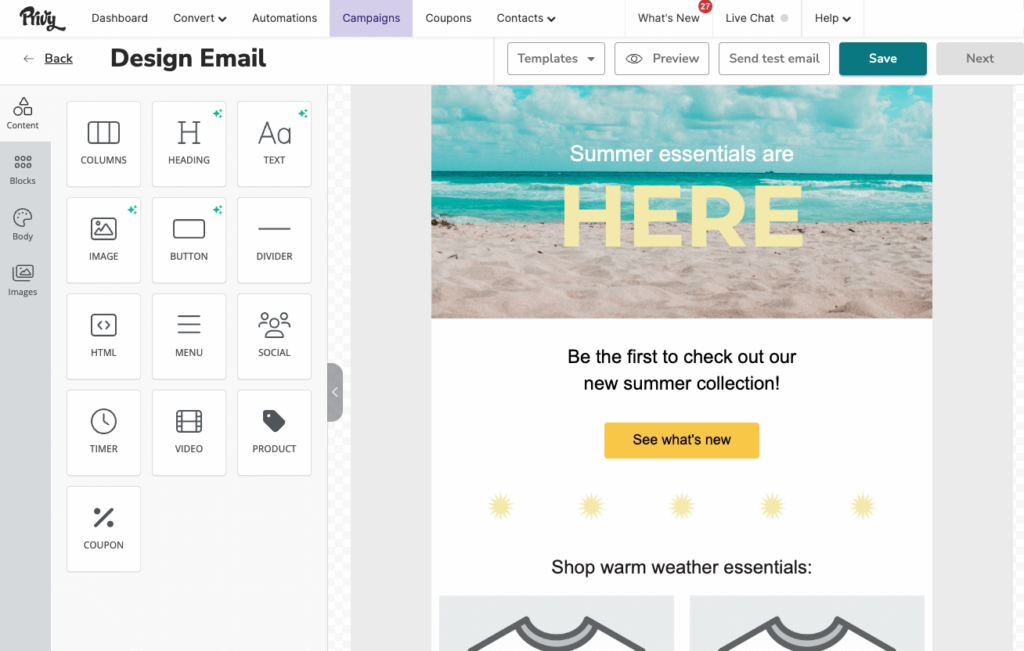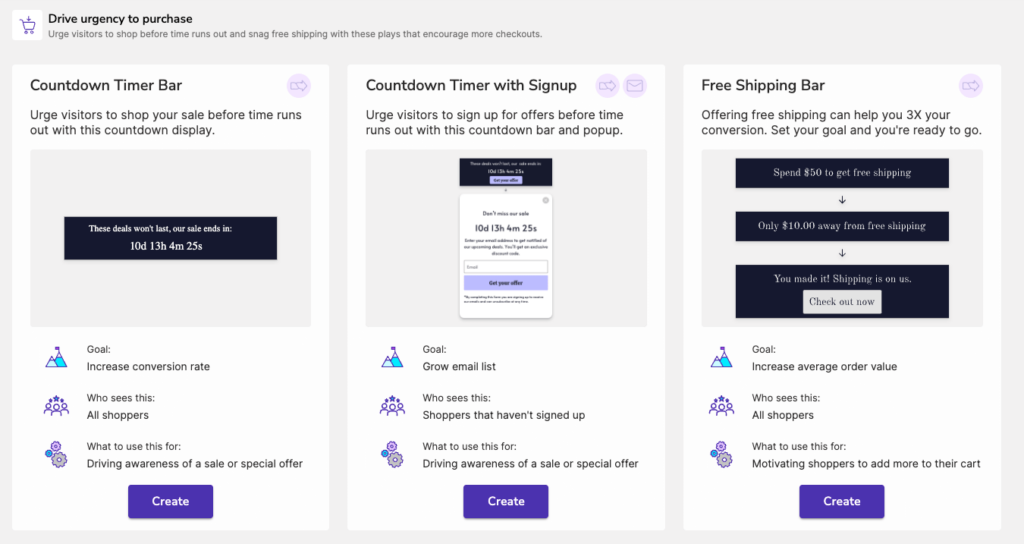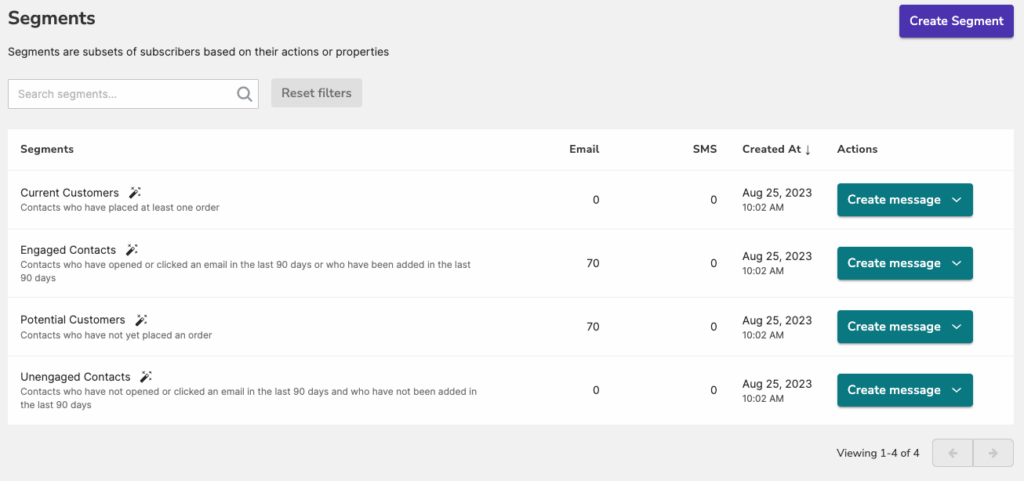With so many email marketing solutions available for small businesses today, it can be tough to decide which to pick.
Should you go with Shopify Email, a tool built into the Shopify ecommerce platform?
Or would Privy, a dedicated email marketing app, be a better choice?
Several key factors must be considered when looking at Shopify Email vs Privy. These include features, pricing, ease of use, and more.
In this article, we’ll compare two email marketing platforms: Shopify Email vs Privy. Our goal? To help you determine which is the better fit for your small business.
Let’s get started.
Shopify Email vs Privy: Quick overview
Privy and Shopify Email offer plenty to any business looking for good email marketing services.
Regarding Shopify ratings, Privy boasts an impressive 4.6 stars out of 5, while Shopify Email has a rating of 3.8 stars.
Along with some standard features, the platforms have unique features and capabilities that set them apart. As such, you must examine their offering to determine which one better serves your needs.
For instance, Shopify Email is a simple and affordable email marketing tool. It lets you create and send emails from your Shopify dashboard.
Meanwhile, Privy is a versatile email marketing tool. It offers features like unique coupon codes, landing pages, signup forms, and more.
Before reviewing the features in detail, let’s check out this Privy vs Shopify Email comparison table for a quick look into what these tools offer.
Let’s start with a detailed comparison of Shopify Email vs Privy to understand how they fare against each other.
Privy vs Shopify Email comparison: Feature by feature
This section will focus on the following aspects:
- Ease of getting started
- Building an email campaign
- Marketing automation
- Signup forms and landing pages
- Segmentation
- Analytics
- Customer support
- Integrations
- Compatibility with other marketing tools
At the end of each section, we’ll announce a winner or declare a tie before selecting the overall winner. This will help you quickly determine which tool suits your needs if you’re in a hurry.
However, we encourage you to read our Shopify Email vs Privy comparison entirely.
Let’s get into it.
Ease of getting started
Both Shopify Email and Privy make it simple to get up and running with email marketing.

They have a simple and quick signup process that doesn’t need a credit card. They also have easy-to-find and well-structured account settings. Users can easily change the sender’s email address and complete other essential functions.
Additionally, both tools have clear, intuitive, and modern interfaces. We didn’t encounter unusual or confusing titles and names.
But this is as far as the similarities between Privy vs Shopify Email go.

That’s because Shopify Email is an app in the Shopify ecosystem that functions like an add-on. The tool only serves Shopify merchants and needs more advanced capabilities.
Meanwhile, Privy is a standalone tool. Anyone can use it to create and send email campaigns, regardless of their platform. Privy offers integration with Shopify and other ecommerce platforms.
Shopify Email wins this round. For Shopify users, it doesn’t get any easier.
Building an email campaign
Both Shopify Email and Privy make it easy to create professional email campaigns.

The tools have intuitive drag-and-drop builders. Naming campaigns and adding preheaders is also straightforward in both tools.
You can choose from various templates and customize them with your logo, colors, and content. You can also add personalization features such as names to subject lines and discount codes.

Another similarity is the type of email campaigns that you can create with each tool. Both tools let you send regular email campaigns and email automation. These include welcome series, newsletters, and abandoned cart emails.
Neither offers A/B testing for emails, though Privy has this option for signup forms.
Regarding templates, Shopify Email has 33 modern, aesthetically pleasing ones. The following categories group these:
- Newsletters
- Announcements
- Product highlights
- Holidays and occasions
- Promotions
With just above 20 choices, Privy’s template gallery is more limited.

Unique to Privy is the ability to create coupon rules. You can reuse these across emails, forms, and landing pages. Plus, Privy enables greater personalization with AI-generated text. It also offers more flexibility to segment contacts.
Is there any feature we’d have loved to see in either tool?
Shopify appeared pretty basic, with only the most crucial features for merchants. There were no image carousels, product recommendations, surveys, etc. As for Privy, it could offer product recommendations to help marketers personalize content.
Privy wins for having more excellent capabilities to scale. It offers more robust options for customization, personalization, and content reuse.
Marketing automation
Both email applications provide easy-to-use automation for sending emails based on customer actions. However, the functionality is basic and limited to critical business cases. Neither Shopify Email nor Privy can compete with platforms like Mailchimp, Klaviyo, or Omnisend.

Shopify Email offers more than ten prebuilt workflows, including:
- Welcome series
- Abandoned cart
- First purchase upsell
- Post-purchase follow-ups
- Customer win-back

Meanwhile, Privy comes with five prebuilt email and SMS workflows, including:
- Welcome email
- Abandoned cart email
- Abandoned cart SMS
- Purchase follow-up
- Customer win-back
The ability to build custom automation significantly differs between the two tools.
Shopify Email allows you to customize email automation based on your chosen events. Privy doesn’t.
You also can’t combine email and SMS into one workflow. Instead, you’re limited to automation that sends either email or SMS independently.
As for Shopify Email, it allows you to integrate push notifications and SMS. You must install extra apps to do so, though, and at an added cost.
We found Shopify Email to have a better automation experience for beginners. Its suggested templates and workflows cover essential scenarios.
On the other hand, Privy’s automation appeared very basic. It lacks robust functionality to create custom omnichannel journeys.
This Shopify Email vs Privy round goes to Shopify Email. Although both tools are pretty basic, Shopify Email optimizes automation capabilities much better for shopping experiences.
Signup forms and landing pages
One of the most important aspects of email marketing is building a list of subscribers.
So, should you pick Privy or Shopify Email?

Privy shines when it comes to converting website visitors. For one, it offers pre-optimized “plays.” These are reusable and ready-to-go templates for high-converting popups. Privy’s customers’ best practices form the basis for them.
Privy forms are modern, sleek, and easy to customize with your branding. You can choose from different designs, styles, and triggers.
Privy also provides analytics of the signup form performance so that you can see:
- How many visitors sign up
- What their conversion rate is
- How they interact with your popups
In contrast, Shopify Email doesn’t provide native tools for creating signup forms or landing pages. You’d need to use a separate Shopify app for that purpose. It can be even Privy forms, for example.
Beyond forms, Privy offers 14 professional landing page templates you can use out-of-the-box. The drag-and-drop editor simplifies customizing pages to highlight offers.

Privy provides an intuitive interface for subscriber management to upload and organize contacts. However, the Privy team takes one to two days to review and approve new contacts.
Meanwhile, Shopify Email does have an advantage when it comes to list management. It’s done directly on the Shopify platform. You don’t have to worry about syncing contacts or importing and exporting data.
The win in this Shopify Email vs Privy round goes to Privy by a landslide. It has everything you need to turn website visitors into email subscribers.
Segmentation
Both Shopify Email and Privy allow segmenting your contact list; so you can create targeted customer groups to send more relevant communications.

Shopify Email uses the core Shopify platform to power segmentation. It offers robust filtering to build lists. In fact, you can reuse the segments you create on the Shopify platform in your email campaigns.
In terms of ready segments, Shopify provides five, including:
- Customers who have purchased at least once
- Customers with more than one purchase
- Abandoned checkouts in the last 30 days
- Customers who haven’t purchased
- Email subscribers
You can also filter your customers by various criteria in Shopify Email. These include purchase history, email engagement, location, and tags.

Privy has four basic segments: current, engaged, potential, and unengaged customers. While it has fewer out-of-the-box segments, Privy still allows combining criteria across:
- Shopping activity
- Website engagement
- Customer properties
- Email metrics
Privy’s segmentation looks pretty good and has many criteria to choose from. However, it lacks some options that Shopify Email has, such as on-site behavior (e.g., pages visited) and tags.
Shopify Email is the clear winner. It has more options and flexibility for dividing contacts based on detailed criteria.
Analytics
You want to know how your campaigns are performing. What kind of engagement are they generating? How much revenue are they bringing in?
Well, both Shopify Email and Privy offer some analytics features. However, they differ in the level of detail and functionality they provide.
Shopify Email displays high-level metrics, including:
- Total sends
- Open rates
- Click-through rates
- Sales attributed to emails or automation workflows
This gives you a basic overview of your email performance. Yet, it doesn’t offer detailed engagement reports. These would provide in-depth insights based on location, device, heatmaps, and so on.
Privy gives you very similar reports:
- Clicks
- Email opens
- Unsubscribes
- Orders generated from campaigns
- Revenue
Like Shopify Email, Privy needs more advanced behavioral insights. These include geolocation or engagement heatmaps, which help optimize content.
Neither solution provides the deep, granular email analytics that competing tools like GetResponse, Mailchimp, Remarkety, and Omnisend offer. There’s ample room for improvement in both tools.
It’s a tie.
Customer support
Having access to timely support is critical to solving issues quickly.
Shopify Email relies on the general Shopify platform support. This means that there’s no dedicated email marketing support team.
Conversely, Privy provides email and chat support. However, it’s only for paid users. Free users have no access to any direct support from Privy.
Both platforms offer lots of resources and tutorials on their websites. The Shopify help center’s resources include:
- Webinars
- Video tutorials
- Comprehensive knowledge base
- Shopify community
- Business courses
Meanwhile, Privy’s resources include:
- Blog
- Masterclass videos
- Marketing podcast
- A swipe file
How easy is it to get urgent queries sorted?
Shopify Email users must look for the contact form or the live chat widget on the Shopify website.
On the other hand, Privy users with more than 9,000 email contacts enjoy one-on-one support.
Reviews on Shopify say Privy’s support could be more responsive and helpful. Similarly, some Shopify Email users report frustrating experiences trying to get support responses.
There’s room for improvement across onboarding and multi-channel support for both tools.
Privy takes a narrow lead because support is also available for all paid users, while Shopify Email users don’t have dedicated support.
Integrations
Both tools can integrate with Shopify, the leading ecommerce platform for small businesses. However, that’s where the similarities end.
Shopify Email doesn’t have any native integrations. However, it can leverage any integration available on Shopify. These include Facebook, Instagram, Google Analytics, and more. This gives you much flexibility, but you must be ready to pay extra.
Privy, on the other hand, is a standalone platform. It offers a smaller set of integrations. These include major ecommerce platforms like Shopify, BigCommerce, and Wix. It also connects with leading email service providers like Mailchimp and Klaviyo.
This round goes to Shopify Email. It offers far more integrations and possibilities than Privy.
Compatibility with other marketing channels
Shopify Email and Privy can help you reach your customers in multiple ways. However, there are some differences in how they do it.
Shopify Email doesn’t natively integrate other marketing channels. But, the Shopify app ecosystem allows connecting SMS, push notifications, Facebook, and more. Be ready to pay extra for those channels.
Meanwhile, Privy allows sending SMS campaigns for an additional fee. However, it lacks native integrations to other digital channels. It also doesn’t support push notifications or Google Ads directly.
This Shopify Email vs Privy round goes to Shopify Email. It gives you more flexibility and options to use different channels through integrations.
Price Comparison
Price is among the most important factors when choosing an email marketing tool.
How do Shopify Email and Privy compare in terms of cost and value?
Let’s take a look at their free and paid plans.
Free plans comparison
Shopify Email has a free plan, while Privy offers a limited 15-day trial of its features.
Shopify Email’s free version includes:
- 10,000 emails per month
- Abandoned cart automation
- Customizable email templates
Privy’s free trial only allows 100 contacts, which is very low for most businesses. But it enables unlimited popups, as well as other offerings, including:
- Access to all popup types
- Advanced popup targeting
- Sync with email service providers
- 100 emails per day
- Shopify coupons
For very early-stage businesses, Privy provides key lead capture capabilities without cost. And Shopify Email doesn’t have anything to offer for list building.
Paid plans comparison
Both Privy and Shopify Email have paid plans.
Shopify Email charges $1 per 1,000 additional emails on paid tiers beyond the free 10,000. Volume discounts kick in when you send more than 300,000 emails per month.
Shopify Email’s pricing is straightforward. It doesn’t matter how many contacts you have. You only pay for the number of emails you send, and you don’t have to worry about tiers or thresholds.
Privy, however, has a more complex pricing structure. Its paid plans come in two packages, Starter and Growth.
Both options are based on the number of contacts and features. But the main difference is that the Growth plan includes SMS marketing. Privy’s paid plans unlock features like:
- Email and SMS campaigns
- Unlimited email sends
- Advanced automation
- Live support
The Privy Growth plan starts at $45 per month, which covers up to 2,000 email contacts and 75 testable contacts.
Here’s a quick Shopify Email vs Privy’s email plan price comparison:
Shopify Email provides more email volume before paying. Meanwhile, Privy charges monthly for access to professional features. Despite Shopify’s per-email charges, Privy is ultimately the pricier solution at higher levels.
For maximizing free email sends for new businesses, Shopify Email is the winner. But as contact lists and feature needs scale, Privy’s unlimited emails and robust functionality at higher tiers justify its premium pricing for more established businesses.
The needs of each business will determine the ideal cost structure.
Shopify Email vs Privy: Which one wins?
Here’s a summary of the features and pricing of Privy vs Shopify Email:
3.7
3.4
500 subscribers – $30
1,000 subscribers – $30
5,000 subscribers – $105
10,000 subscribers – $180
50,000 subscribers – $570
100,000 subscribers – $870
Paying for email sends:
Up to 10,000 emails: Free
$1 per 1,000 emails above 10,000 emails
$0.65 per 1,000 emails above 300,000 emails
$0.55 per 1,000 emails above 750,000 emails
– 15 day trial
– 100 mailable contacts
– Access to all popup types
– Advanced popup targeting
– Sync with email service providers
– Sync with Shopify coupons
– 10,000 emails per month
– Checkout abandonment automation emails
– Email templates
– Extended list of signup forms
– Advanced signup forms functionality
– Intuitive email builder and entire system interface
– Easy to use
– Very easy to use
– Clear navigation
– Nice designs
– Free automations
– Copy-ready emails
– Shopify segmentations
– Basic automation
– Can’t combine email and SMS in one workflow
– Incomplete reporting
– High price
– Limited to Shopify users
– Limited reporting
– Integrations and extra channels at extra pay
– Signup forms
– Nice templates
– Good user experience
– Great usability
– Affordable price
– Simplicity
– Bloggers
– Ecommerce beginners with the main focus on growing the contact list
– Email marketing beginners
– Small Shopify merchants
– Established ecommerce businesses
– Companies with large contact lists
– Established ecommerce businesses
For true beginners, Shopify Email provides an effortless entry into email marketing. Its seamless integration with Shopify stores is ideal for ecommerce customer engagement.
As contact lists and needs advance, Privy becomes the more robust choice. Its lead capture and conversion capabilities empower subscribers’ growth.
Ultimately, the right email marketing platform depends on your business’s maturity and goals.
So, first, evaluate your needs. Then, pick the solution that best positions you for long-term subscriber engagement and revenue growth.
Read full reviews
Related picks for you
Our team strives to be accurate and unbiased in reviewing email tools. However, we recognize that mistakes can happen, and it’s essential for us to stay up to date. If you come across any errors or things that need to be reviewed again, please let us know.





I do trust all the ideas you’ve introduced to your post.
They are very convincing and can definitely work. Still, the
posts are too brief for novices. Could you please prolong them a little from next time?
Thanks for the post.
Amazing! This blog looks just like my old one! It’s on a totally different subject but it has pretty much the same page layout and design.
Superb choice of colors!
Aw, this was an extremely nice post. Taking a
few minutes and actual effort to create a very
good article… but what can I say… I put things off a whole lot and
never manage to get anything done.
I am regular reader, how are you everybody? This post posted at this website is genuinely fastidious.
The other day, while I was at work, my cousin stole
my iPad and tested to see if it can survive a 40 foot drop, just so
she can be a youtube sensation. My iPad is now destroyed
and she has 83 views. I know this is completely off topic but I had to share it
with someone!
You’re so interesting! I don’t think I have read through anything like that
before. So good to discover someone with a few unique thoughts on this subject.
Really.. many thanks for starting this up. This site is one thing that is needed on the web, someone with a little originality!
I love what you guys are up too. Such clever work and coverage!
Keep up the fantastic works guys I’ve incorporated you guys to my blogroll.
What’s up to every body, it’s my first visit of this
webpage; this website contains amazing and actually good information for
visitors.
Heya i’m for the first time here. I came across this board and
I to find It really helpful & it helped me out much. I hope to provide one thing back and help others such as you helped
me.